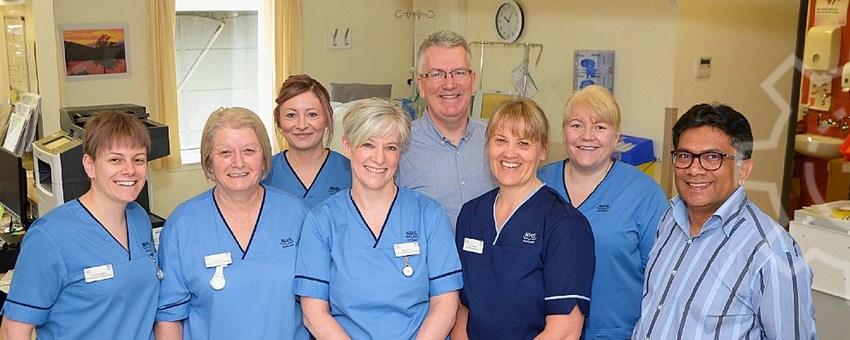Lymphocyte Donation
Lymphocyte donation is carried out as an outpatient in the Clinical Apheresis Unit. If you have previously been asked to donate stem cells or bone marrow for a brother or sister you may be asked to donate lymphocytes at a later date.
Why are lymphocytes needed?
The stem cells or bone marrow previously donated are as a transplant and start to make new blood cells 2-4 weeks later. Following the transplant, it is expected that the blood cells made from the donor stem cells will replace the patient’s cells. However, there is no guarantee that this transplant will be successful in curing the disease. Tests allow us to see at a very early stage if there are signs of disease coming back or signs of the patients own cells reappearing. This does not necessarily mean that the disease is back it does increase the risk of that possibility.
In any of these circumstances, an infusion of Lymphocytes from the donor can help a lot.
Success of the transplant is partly due to the new transplanted cells destroying any remaining cells from the patient’s disease. This is called graft versus disease effect driven by particular white cells known as lymphocytes.
Lymphocytes are present in large numbers in the blood of healthy people. An infusion of lymphocytes given months or sometimes years after a stem cell transplant can boost the patients immunity and help in getting rid of any remaining diseased cells.
If you are happy to donate lymphocytes it is important that we ensure that you are physically fit for the procedure. The assessment visit will include a medical examination and some blood tests. It also gives us the opportunity to talk through the lymphocyte collection procedure.
This assessment visit will take under 2 hours.
It will take a few days for your blood tests to come back. When we are satisfied you are fit to undergo lymphocyte collection we will call and arrange a date that is suitable for you to donate. It is important to arrange this collection as quickly as is possible.
Lymphocytes are collected on a machine called a cell separator. This machine separates blood into its various parts: white blood cells, red blood cells, platelets and the fluid part of your blood – plasma. Your lymphocytes are within the white blood cell layer of your blood and the machine allows us to collect the lymphocytes and return the rest of your blood back to you.
To do this a needle will usually be put into a large vein in each arm. The machine will then draw blood from one arm, take off the lymphocytes and return the rest of the ‘processed’ blood to you through the needle in your other arm. This is a continuous process and so there is only a small amount of blood (about a cup full) out of your body at any one time.
Collecting lymphocytes usually takes 4 hours. We will collect approximately 150/250mls of lymphocyte fluid during the collection. When the procedure is finished, the lymphocytes are transported to the laboratory for processing and storage until needed.
A trained nurse will care for you during the procedure to ensure your comfort and safety. The lymphocytes will be collected while you rest on a bed or reclining chair.
Generally, there are very few side effects with lymphocyte collection and the minor ones that are possible can be treated simply and quickly. Potential side effects are tingling in your lips, nose or fingers or feeling light-headed or faint. Sometimes a donor may feel sick. Nursing staff will be with you and will quickly sort any issues.
You can eat and drink normally during your procedure. Some people can feel quite tired for 24 hours afterward.
Lymphocytes are normally collected from the donor following assessment of the patients response to transplant. The patient will attend the clinic and have their blood monitored regularly. If the patients doctor feel that an infusion of lymphocytes would be helpful we will contact the donor.
Only one Lymphocyte collection is required.
Follow up care: There are not usually any problems after the procedure. Your body will recover quickly from the small number of cells removed during the procedure.

